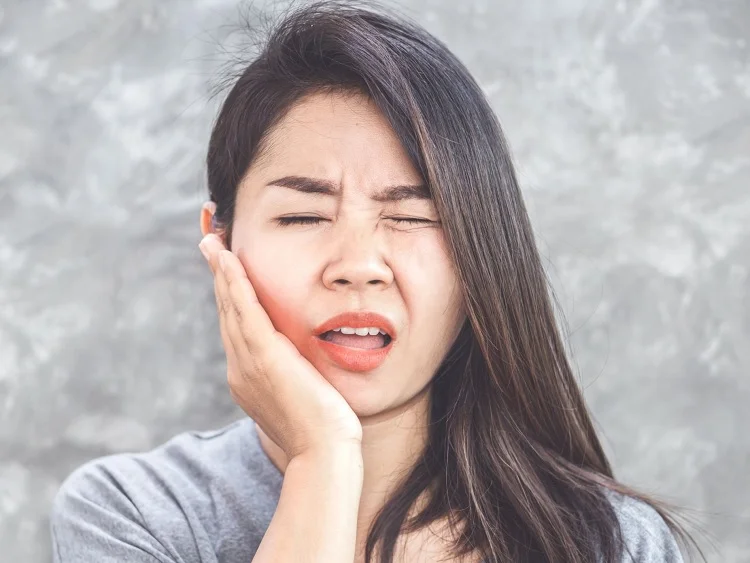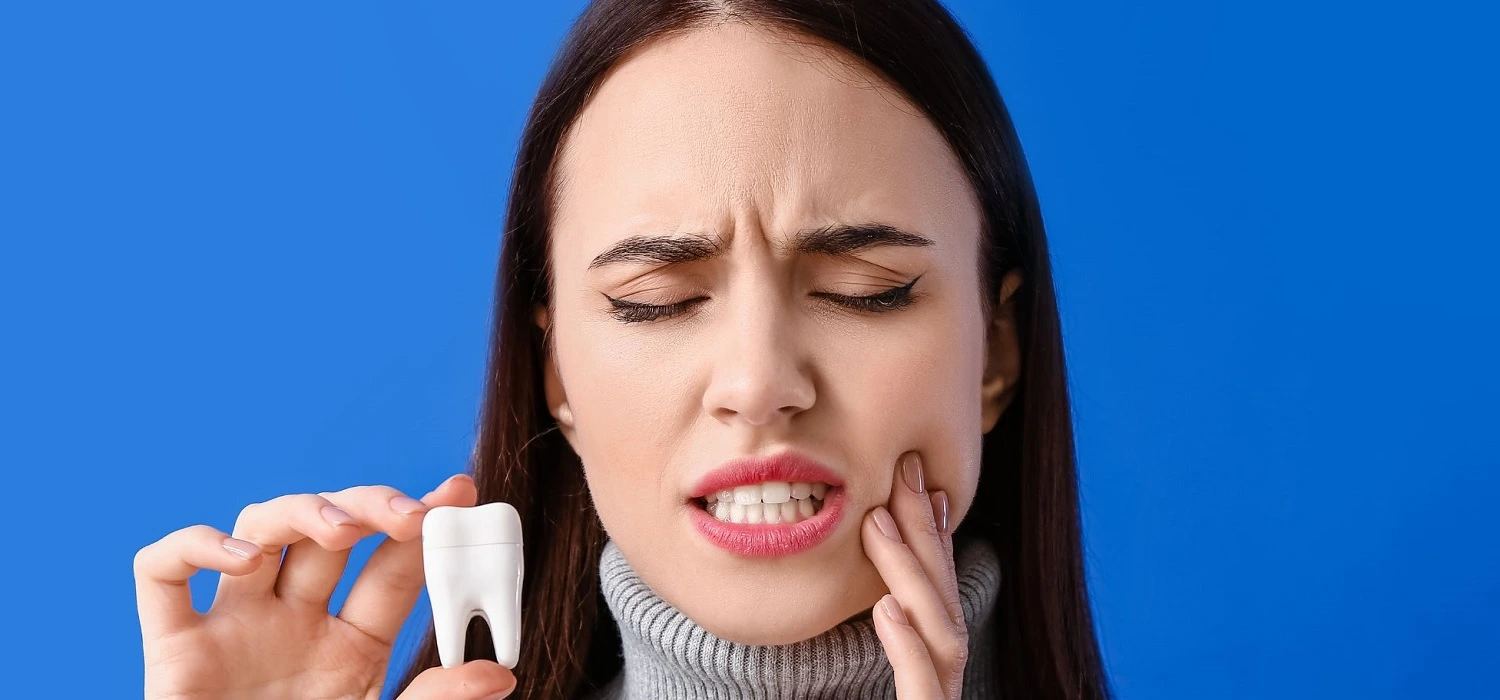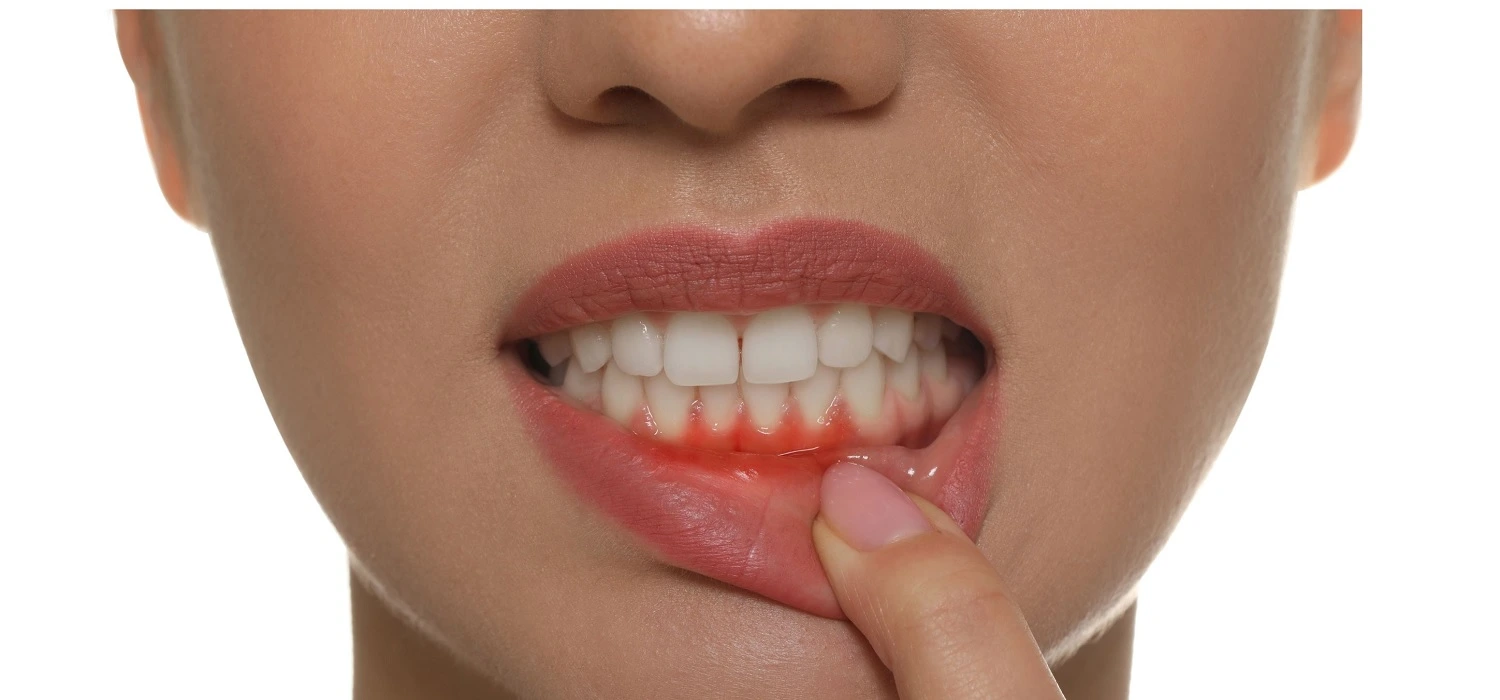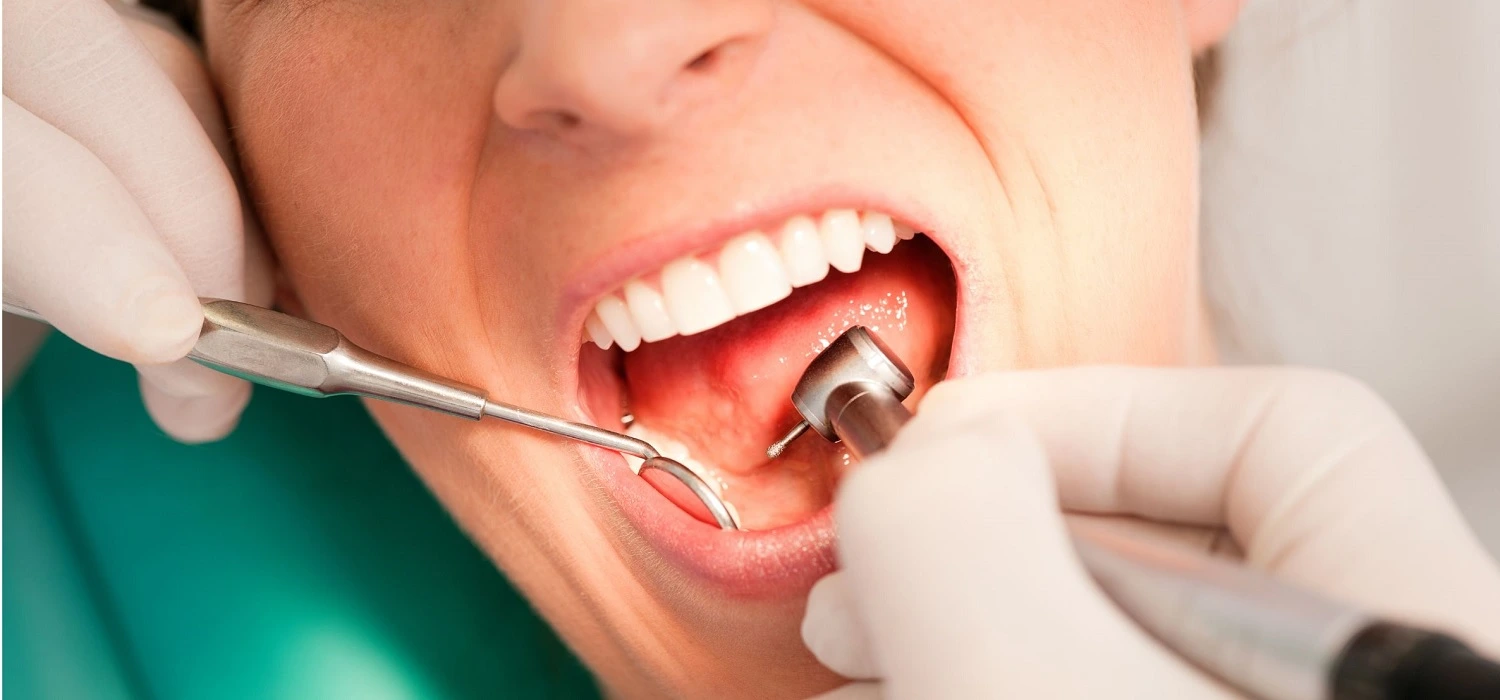Last Updated on: 30th December 2025, 06:28 am
The only way to permanently eliminate dental nerve pain is with timely professional dental care. Depending on the cause, treatments may include fillings, crowns, night guards, root canals, or extractions. Home remedies and over-the-counter painkillers can temporarily relieve pain but cannot replace a dentist visit.
Dental pain is one of the main reasons why people visit the dentist every year.
Sometimes the pain is mild, but other times it is extremely strong. Some women even say they would rather give birth than feel dental nerve pain. Of course, everyone experiences pain differently, but that comparison gives us an idea of how intense it can be.
In this article, you will learn how to deal with dental nerve pain, including home remedies that can help control the pain until you can see a dentist.
What is dental nerve pain?
Dental nerve pain is considered one of the most intense types of pain a person can experience.
To better understand it, imagine a crowded room filled with many people. The only door is closed, and everyone pushes at the same time to get out. Pressure increases, but there is no way out.
A similar process happens inside a tooth. The dental pulp is a soft tissue with nerves, blood vessels, and connective tissue that is completely surrounded by hard layers, such as enamel and dentin.
When the pulp becomes inflamed, it has no space to expand. This creates strong internal pressure, causing intense and persistent pain known as pulpitis.
What types of pulpitis exist?
Dentists classify pulpitis into two types, depending on the severity:
- Reversible pulpitis: The pain appears with cold, heat, or touch but goes away when the cause is removed.
- Irreversible pulpitis: The pain is strong and constant, even without a stimulus. It may cause swelling or infection, and the pulp tissue can die.
Dental nerve pain usually starts as mild discomfort. If ignored, it can quickly get worse and reach a level that affects sleep, work, and daily life.
What causes dental nerve pain?
Dental nerve pain can result from several factors:
- Tooth decay (cavities)
- Cracked or broken teeth
- Infections
- Broken or poorly fitted restorations (fillings, crowns)
- Bruxism (teeth grinding or clenching)
- Gum disease
Usually, nerve pain occurs when an external factor reaches the dental pulp, irritating or infecting it and causing inflammation and persistent pain.
What are the symptoms of dental nerve pain?
The main symptom is tooth pain, which can range from mild to very strong. Depending on the stage, other signs may appear:
Reversible pulpitis
- Sensitivity to cold or sweets that goes away quickly
- Little or no pain when the dentist taps the tooth
- No sensitivity to heat
Irreversible pulpitis
- Strong, throbbing pain that does not stop
- Sensitivity to heat, cold, or sweets that lasts several seconds
- Pain when the dentist taps the tooth
- May include swelling or infection
- Pain often feels worse at night because lying down increases the pressure inside the tooth
If the pulp dies (pulp necrosis)
- No sensitivity to cold, heat, or sweets
- The tooth may still hurt when tapped
What other symptoms can appear in the mouth?
- Swelling and redness
- Bleeding
- Abscess (pus)
- Bad taste or odor
- Gum lesions
- Difficulty swallowing or breathing
What happens if the infection spreads?
- Headache
- Fatigue
- High fever and chills
- Swollen lymph nodes
- Redness of the skin
- Difficulty opening the mouth
Visit the dentist as soon as symptoms appear. If the infection spreads, seek immediate medical care because it can reach vital organs like the heart or brain, which can be life-threatening.
How do dentists kill dental nerve pain?
Treatment depends on the cause and the tooth’s condition. The dentist will evaluate the case, take X-rays, and explain your options.
How is reversible pulpitis treated?
Reversible pulpitis is mild tooth damage where the nerve is not yet affected. The goal is to remove the cause of pain and protect the tooth.
Dental fillings
For mild damage, like small cavities or fractures that haven’t reached the nerve:
- A dentist removes decay or repairs the fracture
- Places a filling to seal and protect the tooth.
- This treatment reduces sensitivity and restores normal function.
Night guard
For pain caused by bruxism (teeth grinding), a night guard or neuromuscular appliance is recommended:
- Protects teeth from wear
- Positions the jaw more comfortably
- Can reduce muscle pressure and pain
Dental Crowns
Crowns are used when a tooth is weakened, but you can still save it:
- Cover the entire tooth like a protective cap
- Restore shape, function, and strength
- Protect the pulp and prevent further fractures
Normally, after one of these treatments, the pain will decrease or disappear within a few days.
If the toothache continues, you should visit the dentist again, as there may be a deeper problem that needs attention.
How is irreversible pulpitis treated?
When the pulp is damaged or infected, more intensive treatment is needed.
Root canal
A root canal is the treatment of choice when the nerve is damaged or infected.
- The dentist removes the infected pulp
- Cleans and disinfects the canals
- Fills the canals with gutta-percha to seal the space
- This treatment preserves the tooth and permanently eliminates the pain.
Generally, a crown is usually placed later to protect the tooth.
Tooth extraction
Extraction is required when the tooth is too damaged to be saved.
- Removes the source of infection and pain
- The lost tooth can later be replaced with dentures, bridges, or dental implants
Many people think antibiotics can treat pulpitis, but they cannot cure it. The truth is that it may help prevent the infection from spreading if treatment is delayed. But only a dentist can prescribe them if needed, depending on your specific case.
How to relieve dental nerve pain at home?
Dental nerve pain needs professional treatment for a permanent solution. However, while you wait for the dentist, these home remedies can help reduce the pain for a short time.
Saltwater rinse
Helps clean the area and reduce inflammation.
- Mix ½ teaspoon of salt in a glass of warm water.
- Swish in your mouth for 30 seconds, then spit it out.
Hydrogen peroxide rinse
It can help kill bacteria and ease discomfort.
- Mix equal parts hydrogen peroxide and water.
- Rinse and spit (never swallow).
Over-the-counter painkillers
Ibuprofen, acetaminophen, or naproxen can reduce pain and swelling.
- Follow the instructions on the package.
- Do not place aspirin directly on the tooth because it can damage your gums.
Cold compress
- Helps numb the area and reduce swelling.
- Apply an ice pack to your cheek for 15 minutes at a time.
Topical anesthetic gels
- Gels with benzocaine can numb the sore tooth and gums for temporary relief.
- Use only for short periods.
Clove oil
- Natural remedy with numbing and anti-inflammatory effects.
- Dab directly on the tooth or gums with a cotton ball.
Other options
- Garlic: Chew a clove or place crushed garlic on the sore tooth.
- Peppermint tea bag: Cool it and place it on the tooth or gums.
- Vanilla extract: Apply a little with a cotton ball to numb the pain.
These remedies only provide temporary relief. Visit a dentist as soon as possible, especially if the pain is severe, lasts for days, or is accompanied by swelling or fever.
How to prevent dental nerve pain?
Most cases of dental nerve pain can be prevented with a combination of good hygiene, regular dental visits, a balanced diet, and general healthy habits.
What hygiene habits protect dental nerves?
- Brush 2–3 times daily with fluoride toothpaste
- Floss daily to remove food particles between teeth
- Use mouthwash to reduce bacteria
- Replace your toothbrush every 3 months or when bristles wear out
Why are regular dentist visits important?
Seeing your dentist every 6 months allows:
- Early detection of cavities, fractures, or infections
- Professional cleaning to remove plaque and tartar
- Prevention of complications that can affect the dental nerve
- Personalized oral health advice based on your case
How does diet affect dental nerve health?
- Limit sugar and processed foods
- Drink enough water throughout the day
- Eat foods rich in calcium, phosphorus, and vitamin D (dairy, fish, nuts)
- Include crunchy fruits and vegetables to naturally clean teeth
What other healthy habits protect dental nerves?
- Avoid tobacco and alcohol
- Use a mouthguard during contact sports
- Manage stress to prevent teeth grinding (bruxism)
- Sleep well and maintain a healthy lifestyle to support your immune system
When should you see a dentist for dental nerve pain?
Seek professional care as soon as the first symptoms appear. Go to the dentist immediately if you notice:
- Severe and constant pain
- Swelling in the face or gums
- Pain that doesn’t improve with over-the-counter medication
- Fever, difficulty opening your mouth, or swallowing
Over-the-counter medicine or home remedies can give temporary relief, but the only way to eliminate dental nerve pain permanently is by treating the cause. It is recommended to visit the dentist as soon as possible to receive the appropriate treatment, avoid future complications, and maintain good oral health.
Frequently Asked Questions
How do you treat tooth nerve pain?
How can I effectively and permanently eliminate dental nerve pain?
How can we reduce tooth pain naturally?
How can I treat tooth pain without removing it?
How do I stop tooth pain fast?
Why does my tooth hurt more at night?
Because when you lie down, more blood flows to your head and it puts pressure on the nerve.
How do I know if I really need a root canal?
If the pain is strong, doesn’t go away, or your tooth is super sensitive, it’s usually a sign you need one.
What foods should I avoid with nerve pain?
Stay away from very sweet, acidic, or really hot and cold foods, they make the pain worse.
Share:
References
1. American Association of Endodontists. (2019, July 25). Tooth Pain. AAE. https://www.aae.org/patients/dental-symptoms/tooth-pain/
2. Johnson, J. (2019, August 23). How to get rid of a toothache at night. Medical news today. https://www.medicalnewstoday.com/articles/326133
3. Park, S. M., Ye, L., Love, R. M., Farges, J., & Yumoto, H. (2015). Inflammation of the Dental Pulp. Mediators of Inflammation, 2015, 1-2. https://doi.org/10.1155/2015/980196
4. Seed, S. (2024, March 24). Toothache Home Remedies. WebMD. https://www.webmd.com/oral-health/home-remedies-toothache
5. Whelan, C. (2019, April 17). What Is Pulpitis? Healthline. https://www.healthline.com/health/pulpitis
-
Nayibe Cubillos M. [Author]
Pharmaceutical Chemestry |Pharmaceutical Process Management | Pharmaceutical Care | Pharmaceutical Services Audit | Pharmaceutical Services Process Consulting | Content Project Manager | SEO Knowledge | Content Writer | Leadership | Scrum Master
View all posts
A healthcare writer with a solid background in pharmaceutical chemistry and a thorough understanding of Colombian regulatory processes and comprehensive sector management, she has significant experience coordinating and leading multidisciplina...




















